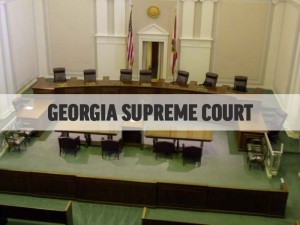ATLANTA - The Supreme Court of Georgia (SCOGA) on Monday will consider the case of a group of lawyers appealing a lower court ruling that concluded they engaged in “false and misleading” advertising about a Toccoa nursing home.
According to court documents, it was a year ago that McHugh Fuller – a Mississippi-based law firm – posted an advertisement in “The Toccoa Record” in Toccoa where PruittHealth has provided nursing home services since 1969.
The law firm said the ad was based on a 2012 survey report about PruittHealth-Toccoa, LLC published by the federal Centers for Medicare and Medicaid Services. The ad showed a photo of a nursing home owned by PruittHealth and said: “ATTENTION! The government has cited HERITAGE HEALTHCARE OF TOCCOA for failing to assist those residents who need total help with eating/drinking, grooming and personal and oral hygiene. If you suspect that a loved one was NEGLECTED or ABUSED at Heritage Healthcare of Toccoa, call McHugh Fuller today! Has your loved one suffered? Bedsores, Broken Bones, Unexplained Injuries, Death.”
At the bottom of the ad was the law firm’s 800 number. The following day, on April 18, PruittHealth sued, seeking a temporary restraining order and an injunction. Pruitt Health argued that the government had never found that its nursing home failed to help residents with “eating” or “drinking;” that the government citation on which the ad was based had been issued two years earlier in May of 2012; that it involved one resident who had long, dirty fingernails, and another who stated she did not have swabs or mouthwash for her gums; and that the nursing home had resolved these problems immediately.
PruittHealth argued it was entitled to an injunction and restraining order because McHugh Fuller had commissioned a deceptive newspaper ad aimed at seeking clients to bring suit against its Toccoa nursing facility, and that the ad violated several provisions of the state Uniform Deceptive Trade Practices Act because it contained false and misleading statements. That day, the trial judge granted the temporary restraining order until a hearing could be held, requiring McHugh Fuller to pull the ad until further notice. The judge scheduled a hearing for three weeks later to address “whether injunctive relief should continue.”
Following the May 13 hearing, where an expert witness from Emory Law School and a partner from McHugh Fuller testified for the law firm, and the nursing home administrator testified for PruittHealth, the judge ruled in favor of PruittHealth. It issued an order May 23, 2014, finding that McHugh Fuller’s “advertisement is false and misleading” and in violation of the Uniform Deceptive Trade Practices Act. The order stated that “defendant is enjoined from publishing or causing the offending advertisement to be published in the future. In addition, within 20 days from the date of this order, defendant shall remove or cause to be removed at its expense all electronic postings of the advertisement by The Toccoa Record, including any electronic archived versions of the advertisement.” McHugh Fuller now appeals to the state Supreme Court.
One of the issues in this case is whether the trial court followed proper procedure by combining a hearing on the interlocutory (or interim) injunction with a final trial on the merits of the case. While that is allowable, the parties must have notice beforehand of the consolidation so they can prepare. McHugh Fuller claimed it did not have notice, although PruittHealth argues it did have notice and came well prepared May 13 to argue the entire case. Following issuance of the court’s May 23 order, McHugh Fuller also claimed it was not clear that the trial court’s ruling was final and that it was issuing a permanent injunction, and it therefore filed additional arguments and documents to be included in the record, pending a final ruling. The trial court ruled, however, that the case had been terminated, and any materials filed after the termination date were not properly part of the record and could not be considered on appeal. McHugh Fuller, in a separate action, now appeals that ruling as well.
Attorneys for the law firm argue the trial court’s order must be thrown out because the court failed to provide notice of its intention to consolidate the hearing on the interlocutory injunction with the trial on the merits.
Attorneys for PruittHealth argue the superior court properly exercised its authority “to ensure that the record in the first appeal truly and fully disclosed what transpired in the trial court.”









